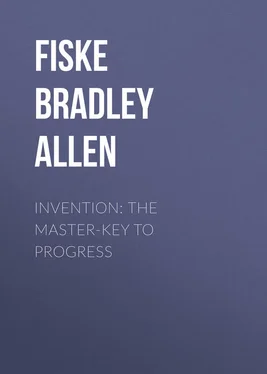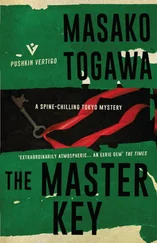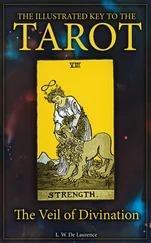Bradley Fiske - Invention - The Master-key to Progress
Здесь есть возможность читать онлайн «Bradley Fiske - Invention - The Master-key to Progress» — ознакомительный отрывок электронной книги совершенно бесплатно, а после прочтения отрывка купить полную версию. В некоторых случаях можно слушать аудио, скачать через торрент в формате fb2 и присутствует краткое содержание. Жанр: foreign_antique, foreign_prose, на английском языке. Описание произведения, (предисловие) а так же отзывы посетителей доступны на портале библиотеки ЛибКат.
- Название:Invention: The Master-key to Progress
- Автор:
- Жанр:
- Год:неизвестен
- ISBN:нет данных
- Рейтинг книги:4 / 5. Голосов: 1
-
Избранное:Добавить в избранное
- Отзывы:
-
Ваша оценка:
- 80
- 1
- 2
- 3
- 4
- 5
Invention: The Master-key to Progress: краткое содержание, описание и аннотация
Предлагаем к чтению аннотацию, описание, краткое содержание или предисловие (зависит от того, что написал сам автор книги «Invention: The Master-key to Progress»). Если вы не нашли необходимую информацию о книге — напишите в комментариях, мы постараемся отыскать её.
Invention: The Master-key to Progress — читать онлайн ознакомительный отрывок
Ниже представлен текст книги, разбитый по страницам. Система сохранения места последней прочитанной страницы, позволяет с удобством читать онлайн бесплатно книгу «Invention: The Master-key to Progress», без необходимости каждый раз заново искать на чём Вы остановились. Поставьте закладку, и сможете в любой момент перейти на страницу, на которой закончили чтение.
Интервал:
Закладка:
Bradley A. Fiske
Invention: The Master-key to Progress
PREFACE
To show that inventors have accomplished more than most persons realize, not only in bringing forth new mechanisms, but in doing creative work in many walks of life, is, in part, the object of this book. To suggest what they may do, if properly encouraged, is its main intention. For, since it is to inventors mainly that we owe all that civilization is, it is to inventors mainly that we must look for all that civilization can be made to be.
The mind of man cannot even conceive what wonders of beneficence inventors may accomplish: for the resources of invention are infinite .
The author is indebted to Ginn & Company, Boston, for the use of illustrations from "General History for Colleges and High Schools," by Philip Van Ness Myers, and "Ancient Times, A History of the Early World," by James Henry Breasted, and to George H. Doran Company, New York, for the use of a map from "A History of Sea Power," by William Oliver Stevens and Allan Westcott.
CHAPTER I
INVENTION IN PRIMEVAL TIMES
Our original ancestors dwelt in caves and wildernesses; had no sewed or fabricated clothing of any kind; subsisted on roots and nuts and berries; possessed no arts of any sort; were ignorant to a degree that we cannot imagine, and were little above the brutes in their mode of living. Today, a considerable fraction of the people who dwell upon the earth enjoy a civilization so fine that it seems to have no connection with the brutish conditions of primeval life. Yet, as these pages show, a perfectly plain series of inventions can be seen, starting from the old conditions and building up the new.
The progress of man during the countless ages of prehistoric times is hidden from our knowledge, except in so far as it has been revealed to us by ruins of ancient cities, by prehistoric utensils of many kinds, and by inscriptions carved on monuments and tablets. The sharp dividing line between prehistoric times and historic times, seems to be that made by the art of writing; for this epochal invention rendered possible the recording of events, and the consequent beginning of history.
Of prehistoric times we have, of course, no written record; and we have but the most general means of estimating how many millenniums ago man first had his being. Geological considerations indicate a beginning so indefinitely and exceedingly remote that the imagination may lose itself in speculations as to his mode of living during those forever-hidden centuries that dragged along, before man had advanced so far in his progress toward civilization as to make and use the rude utensils which the researches of antiquarians have revealed.
Inasmuch as the most important employment of man from his first breath until his last has always been the struggle to preserve his life; inasmuch as the endeavor of primeval man to defend himself against wild beasts must have been extremely bitter (for many were larger and stronger than he), and inasmuch as man eventually achieved the mastery over them, one seems forced to conclude that man overcame wild beasts by employing some means to assist his bodily strength, and that probably his first invention was a weapon.
The first evidences of man's achievements that we have are rude implements of stone and flint, evidently shaped by some force guided by some intelligence; – doubtless the force of human hands, guided by the intelligence of human minds. Many such have been found in caves and gravel-beds over all the world. They were rough and crude, and indicate a rough and crude but nevertheless actual stage of civilization. Some call this the Old Stone Age and others call it the Early Stone Age. Besides stone and flint, bones, horns and tusks were used. Among the implements made were daggers, fish-hooks, needles, awls and heads of arrows and harpoons. One of the most interesting revelations of those rude and immeasurably ancient implements is the fact that man, even in those times, possessed the artistic sense; for on some of them can be seen rough but clear engravings of natural objects, and even of wild animals.
Men naturally supported themselves mainly by hunting and fishing, as savages do now; and it was because they had invented suitable implements and weapons for practicing those necessary arts, that their efforts were successful. The first weapon was probably the fist-hatchet, a piece of sharpened flint about nine inches long, that he grasped in his hand. At some time during the centuries of the Old Stone Age, someone invented a much finer weapon, that continued to be one of the most important that was known, until the invention of the gun, and is used even now in savage lands – the bow and arrow. What a tremendous advantage this weapon was in fighting wild beasts (and also men not possessing it) it is not hard for us to see; for the arrow tipped with flint or bone, could be shot over distances far greater than the spear or javelin could be thrown, and with sufficient force to kill. The club and spear had probably been devised before, for they were simpler and more easily imagined and constructed.
How the bow and arrow came to be invented we have no intimation. The invention of the club and spear did not probably involve much creative effort, so simple were those instruments, and so like the branches that could be broken from the trees. Yet, to the untrained mind of the primeval savage, the idea of sharpening a straight branch of wood into a fine point at the end, in order that penetration through the skin might be facilitated, must have come as an inspiration. No such thing as a spear exists as a spear in nature, and therefore the making of a spear was a creative act. To us, the use of the spear as a projectile may not seem to have required the inventive faculty – unless the hurling of stones may also be supposed to have required it. It may be, however, that with the dull mind of primeval men, even the idea of using stones or javelins as projectiles was the result of a distinct, and perhaps startling inspiration.
The invention of the bow and arrow was one of the first order of brilliancy, and would be so even now. It is not easy to think of any simple accident as accounting for the invention; because the bow and arrow consists of three entirely independent parts – the straight bar of wood, the string, and the arrow; for the bow was not a bow until the string had been fastened to each end, and drawn so tight that the bar of wood was forced into a bent shape, and held there at great tension. When one realizes this, and realizes in addition the countless centuries during which the bow and arrow held its sway, the millions of men who have used it, and the important effect it has had in the overcoming of wild beasts, and the deciding of many of the critical battles of the world, he can hardly escape the conclusion that the invention of the bow and arrow was one of the most important occurrences in the history of mankind.
A still more important occurrence was the invention of making fire. Probably less inventive effort was needed for this than for the bow and arrow; for fire could be seen in the lightning and in trees struck by lightning, and in the sparks that came forth when two hard stones were struck together. The discovery of fire may have been made by accident; but this does not mean that no invention was needed for devising and producing the means whereby fire could be produced at will. To note the fact of a phenomenon, say the production of fire when stones are accidentally struck together, or the falling of an apple from a tree, requires no special effort, and of itself brings forth no benefit; but to reason from the appearance of the sparks to the production of an apparatus for making fire at will; or to reason from the falling of an apple to the enunciation of Newton's Law of Gravitation, is the kind of successful mental effort that has produced the effects which it is the endeavor of this humble book to indicate. These effects have combined as progress has advanced, to put civilized man in a position relatively to his natural surroundings very different from that held by primeval man, and very different from that held by the brutes, both in primeval days and now. Evidently, the effects have been made possible by some faculty possessed by man and not by brutes. This faculty is usually called reason, and is held to be a faculty by means of which man can infer cause from effect, and effect from cause, and can remember events and facts to a degree sufficient to enable him to hold them in his mind, while reasoning about them.
Читать дальшеИнтервал:
Закладка:
Похожие книги на «Invention: The Master-key to Progress»
Представляем Вашему вниманию похожие книги на «Invention: The Master-key to Progress» списком для выбора. Мы отобрали схожую по названию и смыслу литературу в надежде предоставить читателям больше вариантов отыскать новые, интересные, ещё непрочитанные произведения.
Обсуждение, отзывы о книге «Invention: The Master-key to Progress» и просто собственные мнения читателей. Оставьте ваши комментарии, напишите, что Вы думаете о произведении, его смысле или главных героях. Укажите что конкретно понравилось, а что нет, и почему Вы так считаете.












